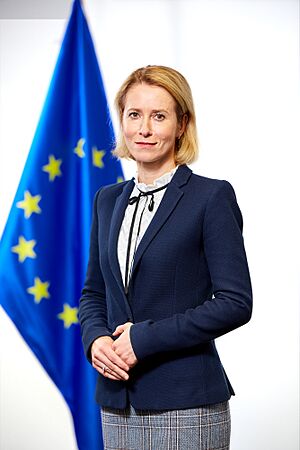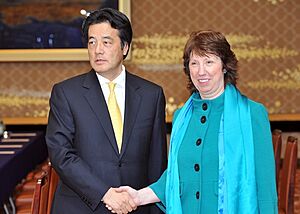High Representative of the Union for Foreign Affairs and Security Policy facts for kids
Quick facts for kids High Representative of the Union for Foreign Affairsand Security Policy |
|
|---|---|

Emblem of the EEAS
|
|
| European External Action Service European Commission |
|
| Abbreviation | HR HR/VP |
| Member of | European Commission |
| Reports to | President of the European Commission |
| Appointer | The European Council with the consent of the President of the European Commission |
| Term length | 5 years |
| Formation | 1999 (CFSP) 2009 (FASP) |
| First holder | Jürgen Trumpf (CFSP) Catherine Ashton (FASP) |
| Deputy | Presidency foreign minister |
| Salary | €288,877 |
| Website | Council, Commission |
The High Representative of the Union for Foreign Affairs and Security Policy/Vice-President of the European Commission (often called HR/VP) is a very important person in the European Union (EU). This person is like the EU's chief diplomat. They help coordinate and represent the EU's Common Foreign and Security Policy (CFSP) around the world. The current HR/VP is Kaja Kallas.
The job of High Representative was first created in 1999 by the Treaty of Amsterdam. Later, the Treaty of Lisbon in 2009 made the role much stronger. It gave the High Representative more powers, including a seat on the European Commission as a Vice-President. This person also leads meetings of EU foreign ministers. The first person to hold this expanded role was Catherine Ashton. To help the HR/VP, the European External Action Service (EEAS) was set up in December 2010. This service acts like the EU's foreign ministry.
Contents
What the High Representative Does
The High Representative helps the EU speak with one voice on global issues. When EU countries agree on foreign matters, the HR/VP can represent them. This person also helps manage the work of special EU representatives and other officials.
The High Representative has several key responsibilities:
- They represent the EU in international meetings and discussions.
- They coordinate the EU's Common Foreign and Security Policy and its Common Security and Defence Policy.
- They are also a Vice-President of the European Commission.
- They take part in meetings of the European Council, which is made up of the leaders of EU countries.
- They lead the European External Action Service (EEAS), which includes EU embassies around the world.
- They are the President of the Foreign Affairs Council, where EU foreign ministers meet.
- They lead the European Defence Agency.
The HR/VP helps prepare new ideas for foreign policy. However, big decisions still need to be approved by the EU countries in the Council. The HR/VP also reports to the European Parliament.
How the Role Started
The position of High Representative was first created by the Treaty of Amsterdam. This treaty said that the Secretary-General of the Council of the European Union would also be the High Representative for foreign policy. So, Jürgen Trumpf was the first person to hold this role, but only for a few months.
The Treaty of Lisbon and a Stronger Role

The Treaty of Lisbon made the High Representative role much more powerful. It combined the job of the High Representative with that of the European Commissioner for External Relations. This meant one person would handle both political foreign policy and the EU's external aid. The new role also took over other foreign affairs duties, like leading the Foreign Affairs Council and representing the EU on the world stage. Before, these roles were often handled by the foreign minister of the country holding the EU presidency.
This change was important because it meant the EU could have one clear voice in international affairs. As Valéry Giscard d'Estaing once said, it would help answer the famous question: "I want to speak to Europe."
How High Representatives Are Chosen
The High Representative is chosen by the European Council, which is made up of the leaders of EU countries. They need a special majority vote to appoint someone. To officially start their job as a Vice-President of the European Commission, the chosen person must also be questioned by the European Parliament. After this, the Parliament votes to approve the entire group of proposed Commissioners.
The High Representative earns a salary similar to other top EU officials.
| No. | Portrait | Name (Born-Died) |
Term | Party | Commission | Member state | |||||
|---|---|---|---|---|---|---|---|---|---|---|---|
| Took office | Left office | Duration | European | National | |||||||
| As High Representative for Common Foreign and Security Policy – Secretary-General of the Council of the EU | |||||||||||
| – |  |
Jürgen Trumpf (1931–2023) |
1 May 1999 | 18 October 1999 | 170 days | Independent | Independent | N/A | Germany |
||
| – |  |
Javier Solana (born 1942) |
18 October 1999 | 1 December 2009 | 10 years, 44 days | PES | PSOE | N/A | Spain |
||
| As High Representative of the Union for Foreign Affairs and Security Policy – Vice-President of the European Commission | |||||||||||
| 1 |  |
Catherine Ashton (born 1956) |
1 December 2009 | 1 November 2014 | 4 years, 335 days | PES | Labour | Barroso II | United Kingdom |
||
| 2 |  |
Federica Mogherini (born 1973) |
1 November 2014 | 30 November 2019 | 5 years, 29 days | PES | PD | Juncker | Italy |
||
| 3 |  |
Josep Borrell (born 1947) |
1 December 2019 | 30 November 2024 | 4 years, 365 days | PES | PSOE | Von der Leyen I | Spain |
||
| 4 |  |
Kaja Kallas (born 1977) |
1 December 2024 | Incumbent | 1 year, 82 days | RE | REF | Von der Leyen II | Estonia |
||
Javier Solana (1999–2009)

Javier Solana was the first permanent High Representative. He started in October 1999. His job was to represent the EU on the world stage. During his time, the role grew a lot. He also became the head of the European Defence Agency.
Solana was known as a "quiet diplomat." He helped negotiate many agreements between the EU and countries in the Middle East and Latin America. He also played a big part in trying to solve the Israeli–Palestinian conflict. He worked with the UN, Russia, and the United States on the "Road map for Peace." He also helped mediate during the Orange Revolution in Ukraine.
Catherine Ashton (2009–2014)
Catherine Ashton became the first High Representative with the expanded powers under the Treaty of Lisbon. She started in December 2009. Before this, she was the EU's Trade Commissioner. She was responsible for setting up the European External Action Service (EEAS), which acts as the EU's diplomatic corps.
Ashton's main goals included improving relations with the US and China, addressing climate change, and managing international crises. She played a key role in negotiations, especially in helping to normalize relations between Kosovo and Serbia. She also led important talks with Iran about its nuclear program, which led to an interim agreement in 2013. Many praised her for her strong negotiating skills.
Federica Mogherini (2014–2019)
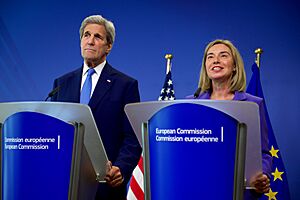
Federica Mogherini took over the role in November 2014. She had been Italy's Foreign Minister. Some countries were initially concerned about her views on Russia. However, she quickly focused on important issues.
Mogherini worked to start discussions between Russia and Ukraine to help solve their crisis. She also received praise for her role in negotiating the Joint Comprehensive Plan of Action. This was an international agreement about Iran's nuclear program in 2015.
Josep Borrell Fontelles (2019–2024)
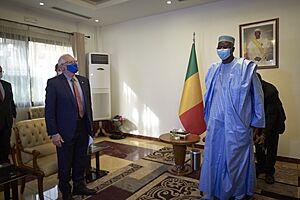
Josep Borrell became the High Representative in December 2019. He focused on global challenges, including the COVID-19 pandemic. In 2020, he helped launch the "Team Europe" aid package. This package provided over €20 billion to help partner countries deal with the pandemic and its economic effects. He stressed that fighting the virus required global teamwork.
Borrell also spoke out on international conflicts. He warned Russia about respecting Ukraine's borders in 2022. During the Gaza war that started in 2023, he often criticized Israel's actions. He called the siege of Gaza illegal and said that forced displacements were strictly forbidden. He also supported funding for UNRWA, a UN agency helping Palestinian refugees.
Kaja Kallas (2024–present)
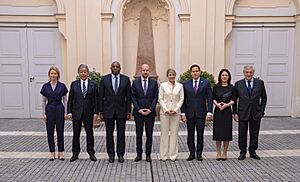
Kaja Kallas became the High Representative on December 1, 2024. On her first day, she visited Ukraine with other EU leaders. She expressed strong support for Ukraine in the ongoing conflict. She also warned the Georgian government against using violence during protests. She threatened sanctions if they did not respect human rights.
Images for kids
-
Kaja Kallas, the current High Representative
-
Javier Solana in 1999
-
Kaja Kallas in 2024
See also
 In Spanish: Alto representante de la Unión para Asuntos Exteriores y Política de Seguridad para niños
In Spanish: Alto representante de la Unión para Asuntos Exteriores y Política de Seguridad para niños
- Ambassadors of the European Union
- Common Foreign and Security Policy (CFSP)
- European External Action Service (EEAS)
- Foreign relations of the European Union
 | Jewel Prestage |
 | Ella Baker |
 | Fannie Lou Hamer |


